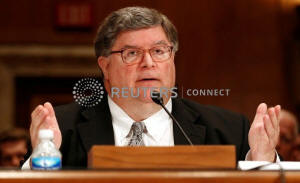Pandemic aid watchdog steps into partisan war over bailouts
 Send a link to a friend
Send a link to a friend
 [June 26, 2020]
By Lawrence Delevingne, Chris Prentice and Koh Gui Qing [June 26, 2020]
By Lawrence Delevingne, Chris Prentice and Koh Gui Qing
(Reuters) - Brian Miller would have one of
the toughest jobs in Washington even without the cutthroat politics all
around him. As America’s inspector general for pandemic relief, he’s
charged with rooting out fraud in the spending of trillions of dollars
in emergency aid.
But before even starting work, he was blasted by Democratic lawmakers
who say he’ll be more of a lapdog than watchdog, citing his recent
history as a lawyer in Donald Trump’s White House. And Trump himself -
who in recent months has ousted a raft of inspectors general,
prosecutors and other officials - signaled that he’ll keep Miller on a
tight leash, forbidding him from reporting to Congress without
“presidential supervision.”
How Miller, a Trump appointee, handles such pressures will test the
administration’s willingness - or lack of it - to demand accountability
in pandemic relief spending. Miller’s response also could make or break
the reputation the veteran prosecutor and inspector general has built
over decades.
Reuters interviewed more than two dozen people who know Miller or have
insight into the job confronting him to understand how he might tackle
it. Supporters from across the political spectrum expect Miller to
investigate aggressively and impartially. They say he has prosecuted
high-profile cases and weathered political controversy as an inspector
general - including an uproar over an investigation he led that forced
the resignation of the Republican chief of the General Services
Administration (GSA).

But the new post - Special Inspector General for Pandemic Recovery -
poses far higher logistical and political hurdles for the 64-year-old
attorney, a Presbyterian elder who married his high school sweetheart
and lives in a modest ranch house in Fredericksburg, Va.
Miller declined to comment for this story. He acknowledged that the
position will be “very challenging and demanding” during his
Congressional vetting on May 5.
Gordon Heddell, who has served inspector-general stints at the Labor and
Defense departments, called Miller’s work “outstanding” in his job at
the GSA. Still, Heddell said, any inspector general under Trump has to
expect “a day of reckoning.”
White House spokeswoman Sarah Matthews declined to comment on concerns
that Miller’s independence could be compromised by his recent White
House work and Trump’s record of firing inspector generals.
Miller’s appointment, announced in April, places him at the center of a
roiling battle over transparency in pandemic spending. The
administration initially fought to keep secret the names and loan
amounts of recipients in a $660 billion program offering forgivable
loans to businesses. The Treasury Department has since agreed to
disclose information for awards over $150,000 - a threshold Democratic
critics say will still hide most payments. The administration has said
it will balance transparency concerns with protecting what it calls
confidential business information.
The White House also took heat from lawmakers for issuing guidance they
said allows federal agencies to ignore legislative mandates to collect
and report details on how aid recipients spend the money to save jobs.
The legislation calls for reporting that information to the Pandemic
Response Accountability Committee - of which Miller is a member.
[nL1N2DV1ZA]
Miller's remit focuses immediately on a $500 billion portion of the aid
package administered by the Treasury Department, such as airline
bailouts and funding for Federal Reserve emergency lending. But the law
opens the door for him to oversee other bailouts, including the business
loan program.
Skeptics of Miller mostly cite his most recent job, as a senior
associate White House counsel starting in December 2018. While he
generally kept a low profile, Miller angered Democrats with a letter
denying a Congressional watchdog agency’s information request related to
the Ukraine impeachment inquiry.
“Trump is making appointments based on loyalty,” said Virginia Canter,
ethics counsel at the Citizens for Responsibility and Ethics in
Washington and a former White House lawyer under two Democratic
presidents. “So you have to ask yourself: Can you commit yourself to
representing the public interest when your past job was being the
president’s lawyer?”
Democratic lawmakers have been more blunt. Trump “put a fox in charge of
the henhouse,” said Connecticut Senator Richard Blumenthal in a
statement.
FROM THEOLOGY TO LAW
Former colleagues describe Miller as a serious and unpretentious veteran
attorney. Before entering the law, Miller had planned a career in the
church. He earned a bachelor’s degree from Temple University in
Philadelphia, and dual master’s degrees from nearby Westminster
Theological Seminary. When he didn’t immediately find a position, he
went to law school at the University of Texas, graduating in 1983.
Miller is active at the small Presbyterian church in the Washington
suburbs, where his son is the pastor. His minister at a previous church,
Bob Becker, calls Miller humble and grounded, with a “heart of service.”
After a few years in private practice, Miller in 1987 joined the
Washington-based U.S. Commission on Civil Rights and in 1990 moved to
the Justice Department, where we worked for 15 years. Some of his
best-known work came as a prosecutor in the Eastern District of
Virginia, a high-profile outpost dubbed the “rocket docket” for its
fast-moving cases.
[to top of second column]
|

GSA Inspector General Brian Miller testifies during a hearing by
the Senate Appropriations Financial Services and General Government
Subcommittee on "General Services Administration (GSA): A Review of
the Recent Inspector General Management Deficiency Report and An
Assessment of the FY2013 GSA Funding Request" on Capitol Hill in
Washington April 18, 2012. REUTERS/Kevin Lamarque

During that time, Ed Gibson was a Federal Bureau of Investigation
agent investigating money-laundering cases. He remembers Miller
pulling him aside when he wanted a more severe punishment for a
white-collar conviction. Miller asked Gibson something that sticks
with him today: “Ed, is that really what you want? Isn't it justice
you are seeking?”
Miller embraced difficult cases, including the complicated
prosecution of a physician accused of overprescribing opioids -
known as “Dr. Feelgood” - and that of Zacarias Moussaoui, who helped
plan the September 11, 2001 attacks.
“He was just tremendous,” said Gene Rossi, a fellow prosecutor at
the time who credits Miller’s calm diplomacy with saving the opioid
case.
TERRORIZING REPUBLICANS
Former colleagues say Miller didn’t hesitate to take on the
Republican leadership of the GSA, a sprawling agency coordinating
billions in spending.
During nine years there as inspector general, starting in 2005,
Miller was an aggressive watchdog - so much so that the agency's
chief, Lurita Doan, once suggested he and his staff were practicing
a form of terrorism, according to a Washington Post report at the
time.
Doan froze hiring in Miller’s office and tried to cut its spending.
GSA staff filed complaints against Miller, and Congress members
called on President George W. Bush to fire him, according to
Congressional hearings and reports.
Undeterred, Miller revealed that Doan had steered a GSA contract to
a friend, among other interventions. Congress excoriated Doan, who
resigned under pressure in 2008. Doan denied wrongdoing at the time;
she did not respond to a request for comment.
"What ultimately came out vindicated Brian,” said Ted Stehney, the
former head of audits in Miller’s GSA office.
Miller later drove an investigation into a lavish GSA staff event
near Las Vegas that resulted in the resignation of the agency's new
chief, Martha Johnson, an appointee of President Barack Obama.
Ex-GSA chief Johnson - who was not directly involved in planning the
conference and supported Miller’s investigation - called him a
diligent auditor but said his passions could be small-minded. While
he unearthed the conference spending abuses, Johnson said, “It was
like 'really’?' GSA is in the thick of all-of-government spending -
federal, state, local, tribal, war theater - and this is what he was
fussing with?”

Miller is as parsimonious in his personal life as he expects others
to be in government. Stehney, the former GSA colleague, said Miller
has always wanted a Cadillac but never bought one.
“He loved to ride in mine, but he still drove his Honda hybrid,” he
said.
'DUTY TO SERVE'
Some associates were surprised when Miller departed from his usual
nonpartisan practices by taking a White House job.
Miller told a friend he wanted to get back to public-sector work
after a stint in private practice, defending clients from government
investigations. Miller told the friend that he “felt a duty to
serve” when approached about the White House job.
The few details that have emerged from Miller’s White House work
have fueled concerns over his independence.
Democrats called Miller’s denial of a Government Accountability
Office (GAO) request regarding the impeachment inquiry improper.
Miller downplayed the letter in the May Congressional hearing as
“answering the mail,” saying he merely referred the matter to the
White House Office of Management and Budget, which had previously
responded, providing some information but denying other requests.
He also received an ethics waiver allowing him to continue working
with current GSA head Emily Murphy after taking his White House
role. While in private practice, Miller had advised Murphy during a
GSA inspector-general probe into the cancellation of a relocation of
the FBI’s Washington headquarters. The move could’ve hurt revenue at
Trump's nearby hotel.
A friend of Miller from Washington legal circles, speaking on
condition of anonymity, said he understood the raised eyebrows over
Miller’s White House work.
“If I didn’t know Brian, I would be suspicious given what Trump has
done with the IG community,” the friend said. “But he’s Brian. He
will do his job, and if it means he gets fired for it, he gets fired
for it.”
(Reporting by Lawrence Delevingne, Chris Prentice and Koh Gui Qing;
Additional reporting by Pete Schroeder; Editing by Tom Lasseter and
Brian Thevenot)
[© 2020 Thomson Reuters. All rights
reserved.] Copyright 2020 Reuters. All rights reserved. This material may not be published,
broadcast, rewritten or redistributed.
Thompson Reuters is solely responsible for this content. |